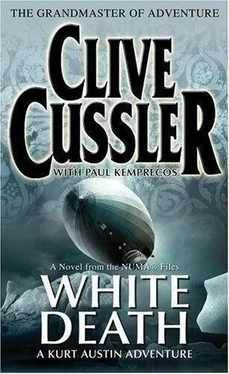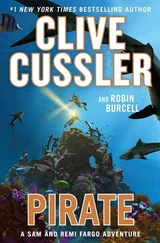The crowd was cheering madly, and it went wild when the blue sled increased the lead to half a length. Another few feet and the blue sled would be able to pull over in front of the red one, blocking the way and controlling the race. The blue driver kept glancing over his shoulder, looking for an opportunity. He got his chance in the fourth and last curve.
The leading sled, on the outside, came into the turn at a perfect speed and angle to put him completely ahead of the other racer. But the red sled suddenly veered to the right, and its front wheel caught the leader's rear-left tire. The blue sled fishtailed from the impact, and the driver fought to bring it under control. The dogs sensed the whiplash about to take place and tried to compensate by pulling harder, but the centrifugal forces acting on the light vehicle proved too potent.
The blue sled went up on two wheels and flipped. The driver went airborne, like a circus performer shot out of a cannon. He hit the grass hard, rolled several times and lay still. The dogs kept run- ning and dragged the sled on its side until they could pull it no far- ther. Then they began to fight among themselves. The handlers ducked under the yellow tape and rushed in to get the dogs under control, while others tended to the fallen driver.
The red-sled driver pushed ahead at full speed, although he had the race won, not slowing until he had passed over the finish line. The sled was still moving when he jumped off it and grabbed a harpoon from a barrel. Without pausing to aim, he sent the spear winging to- ward an archery target set up near the course. The spear hit the bull's- eye at dead center. Then he pulled a hatchet from his belt and hurled it at the target as well. Bull's-eye again.
The victorious driver raised his fists high in the air and let out a chilling cry of victory, then strutted around the perimeter of the race course, his wide mouth set in a grin, his face like a malevolent jack- o'-lantern. His arrogant posturing put to rest any doubts that the col- lision was an accident. A lone boo issued from the stunned crowd, then was joined by others, growing into an angry chorus as the spec- tators showed their disapproval of the winning tactics. Disgusted with the race, guests began to move back to the museum.
The driver gestured at the departing spectators as if daring some- one to step forward. His gaze swept the crowd-looking for anyone brave or foolish enough to take him on-when it fell on Austin. The dark eyes narrowed into slits. Austin tensed. Standing only a few feet away was the man who had slashed him and tossed a hand grenade into his boat at the Mermaid's Gate. He would have recog- nized the man from the hate burning in his feral eyes even without the vertical tattoo lines on the cheekbones and the mangled knot of flesh where Austin had bashed him in the nose.
The thick lips in the dark, wide face formed a silent word. Austin.
Austin was stunned that the man knew his name, but he hid his surprise.
Using his most mocking tone, he said, "Long time no see, Nanook. You owe me for the plastic surgery I did on your pretty face."
The driver stepped closer until they were a foot or so apart, sepa- rated only by the yellow tape. Austin could smell the man's fetid breath.
"The name is Umealiq/' he said. "I want you to call my name when you beg me for mercy."
"Don't blame you for being dissatisfied with your nose job," Austin said evenly. "You didn't give me a lot to work with. Pay me for the boat you blew up and we'll call it even."
"The only payment you will get is death,ff the man snarled. His thick fingers dropped down to his belt, and he began to slide the bone knife from its scabbard. Although most of the spectators had left, there were still knots of people hanging around. Austin sensed that there was no safety in numbers and the man would not hesitate to kill him, even in front of dozens of witnesses. He clenched his right fist, ready to send it crashing into the broken nose, where it would inflict the most damage and pain.
Then, out of the corner of his eye, he saw a sudden movement. Ben Nighthawk had hurled himself at the driver. The Indian was too light and his tackling form too imperfect to do any damage. The driver grunted, and his squat body shuddered slightly from the im- pact, but he kept his footing and swatted Nighthawk aside with a mighty blow.
Again the hand groped for the knife, and he took a step forward, only to freeze at the sound of a commotion. The blue-sled driver was making his way across the Mall, accompanied by several angry han- dlers. Dirt and blood stained his face. Umealiq whirled to face the newcomers. They exchanged angry words, obviously arguing over the race tactics. With a quick burning glance back at Austin, the red- sled driver pushed his way through the others and made his way back to the trucks.
Therri was down on her knees, tending to Nighthawk. Austin went to her side and saw that the Indian's only injury was a bruise where he'd been struck under the eye. As they helped him to his feet, he spit the words out: "That was the man who killed my cousin."
"You're sure?" Therri said. Nighthawk nodded dumbly. His dazed eyes fixed on the figure walking across the Mall, and he stumbled forward. Austin saw where he was going and stepped in front of him, barring his path. "He and his pals will kill you."
I don t care.
"Now is not the time," Austin said, in a voice that said he wasn't yielding.
Nighthawk saw that his determination wasn't enough to get him past Austin's wide shoulders. He swore in his native language and stalked across the Mall toward the museum.
Therri said, "Thanks for stopping Ben. We should tell the po- lice."
"Not a bad idea. But it might be a problem." A group of men was striding onto the Mall from the direction of
the museum. In the lead was the tall figure of Dr. Barker. He hailed Austin like a long-lost buddy.
"Nice to see you again, Austin. I'm on my way out and stopped to say good-bye."
"Thanks, but I'm not going anywhere."
"Oh, but you are. Umealiq is waiting for you and your friend. You're about to learn why he is named after the stone-headed lance the Inuit use on seal hunts."
Barker pointed to where Scarface stood in the middle of the race- course. Then, escorted by two bodyguards, he strode off to where a limo awaited, leaving the rest of his men behind.
Others came running over from where the trucks were parked. Austin did a quick count and estimated that there were about twenty men in all. Not exactly great odds. Their prospects didn't get any bet- ter when a couple of men ran over to the portable lights that had il- luminated the racecourse and snapped them off.
The Mall had become a big and lonely place. The nearest police presence was a traffic cop on Madison Drive stopping cars so the guests could return to the museum. The remaining guests were mak- ing their way back to the reception, and the passersby had resumed their strolls. Austin's sharp eye followed the shadows that were mov- ing across the grass in a classic encircling maneuver.
He took Therri's arm and tried to guide her toward the museum, but Barker's men barred their way. It was a repeat of the scene in Copenhagen, but this time Austin had no trash-can lid to use as a shield and a weapon. He could see several strollers, and even a cou- ple of National Park Service people, walking through the Mall un- mindful of the unfolding drama, but decided against calling for help. Anyone he talked to would be put in immediate danger.
One light had been left on. Standing in the bull's-eye of illumina- tion, like an actor in the spotlight, was Umealiq. His hand was on his scabbard. His men were closing in from the sides and behind. Austin had no choice. He took Therri's hand, and they slowly began to walk toward what was certain death.
Читать дальше












